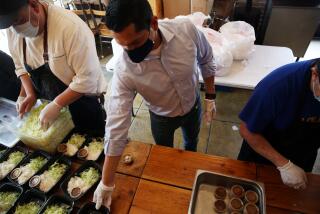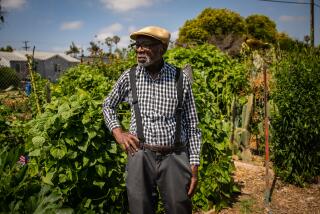He lost his quesadilla stand to the pandemic. Now he feeds needy people
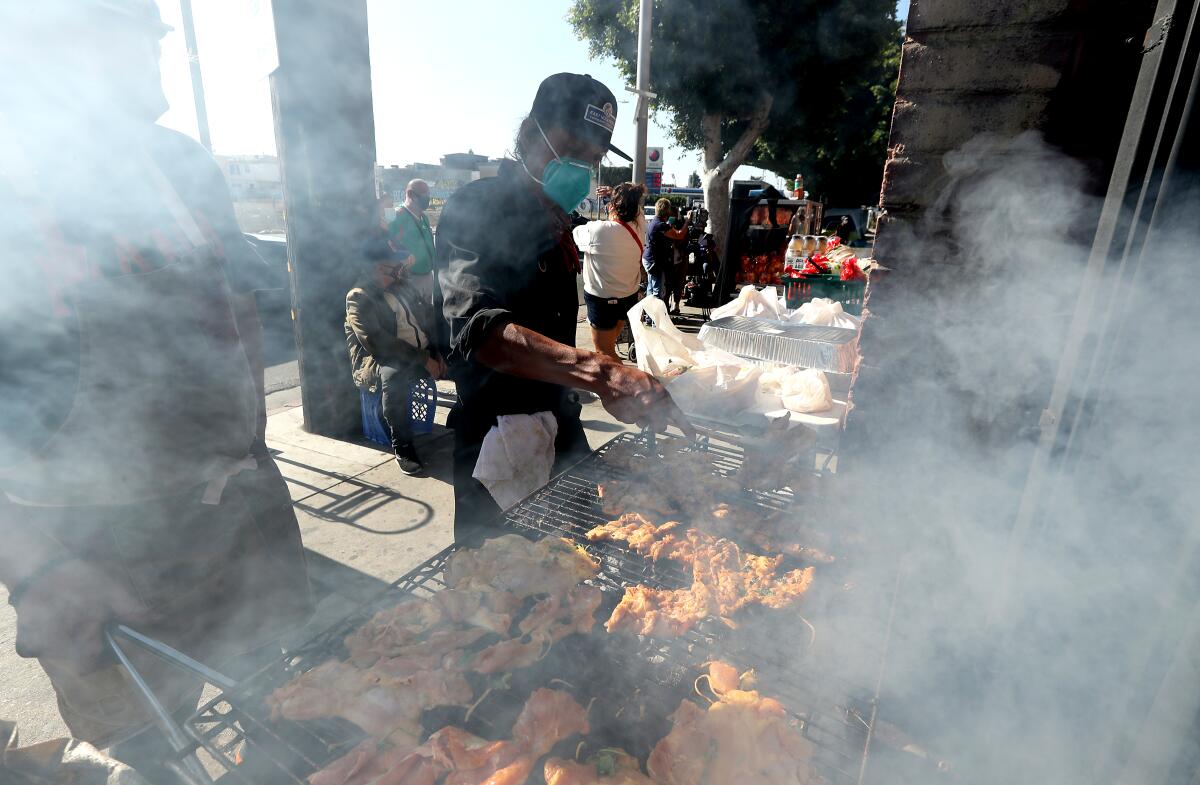
After a lifetime of working for other people, Heleo Leyva struck out on his own last year.
With his brother Filimon, he opened a quesadilla stand in East Hollywood, named after their hometown in Mexico.
Customers raved about the handmade blue corn tortillas, filled with chicken, beef or squash blossoms. They grew the squash themselves.
The cash rolled in, one quesadilla at a time.
Then came the coronavirus pandemic and a crackdown on street vendors in mid-March, just over a year into the stand’s life.
Leyva, 42, remembered the lesson his father had taught him in rural Tepexco.
He was 5 or 6 years old. His father dropped a dozen seeds into his palm and told him to “grow tomatoes.”
Unsure of what to do, Leyva swallowed the seeds.
By the next year, he had grown his own crop of tomatoes. Even a small boy could make something valuable out of a few specks.
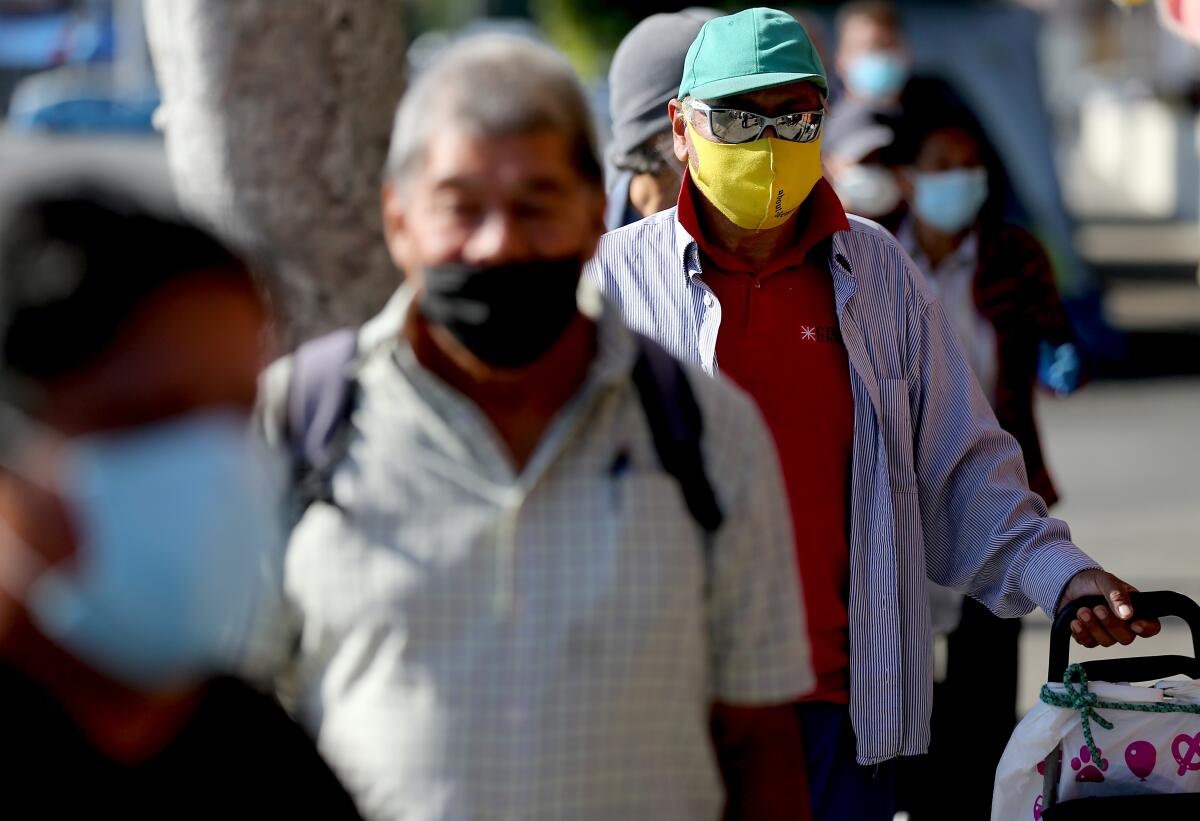
“It was devastating, and you didn’t know what was happening,” Leyva said of the pandemic. “But like my father showed me when I was a kid, you have to adapt.”
First, he sold his quesadillas and burritos through Instagram. But revenues were limited.
Even then, he thought of others, encouraging patrons to purchase food for the hungry neighbors he spoke with daily. Many had lost their jobs, their homes and their dignity in a flash.
The quesadilla stand had been near his apartment, where he had lived since he was a teenager attending Los Angeles City College. In a short time, the stand became as much a part of the community as he was.
People were begging him to employ them, when he was barely getting by himself. His internet was disconnected because he couldn’t pay the $325 bill.
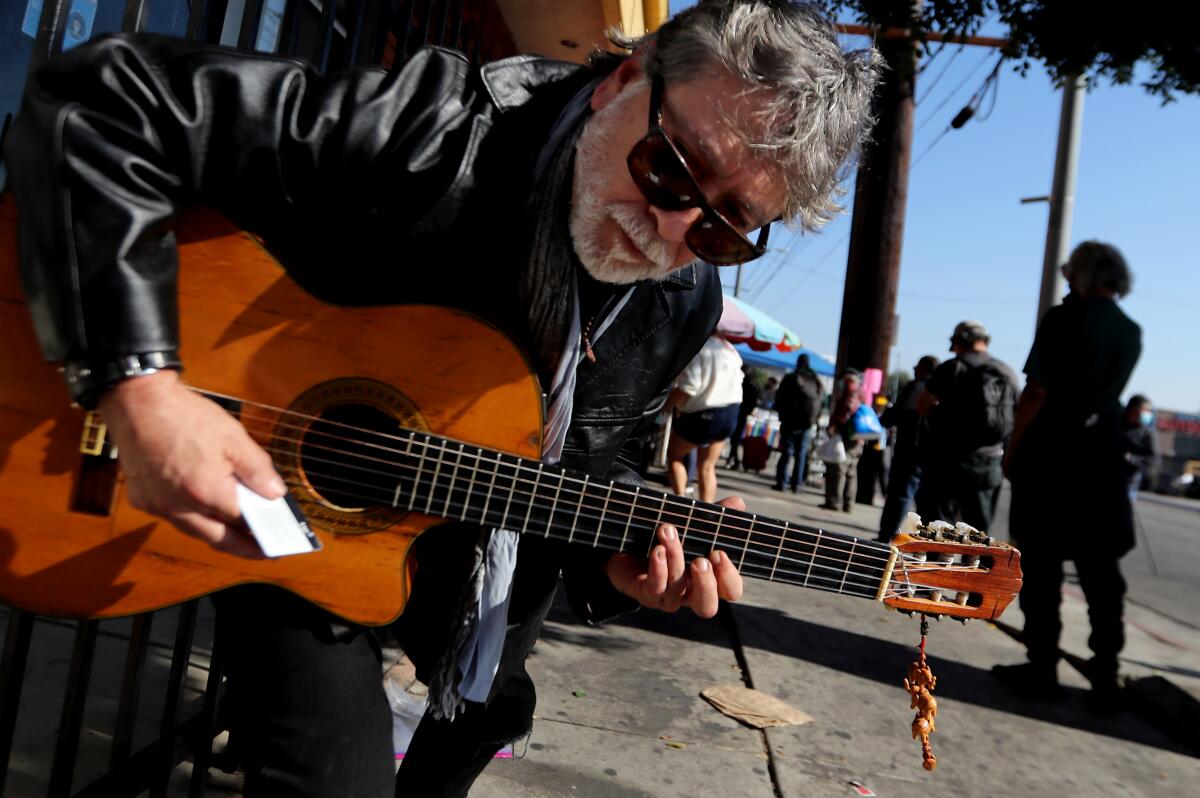
Since he had no money of his own, he found other ways to help.
He reached out to the newly formed Instagram group Los Angeles Community Fridges, helping East Hollywood establish a neighborhood refrigerator in late July, with electricity provided by Santa Monica Grocery Store.
Community members could donate or pick up perishable goods like milk and cheese, along with vegetables, bread, meat and frozen dinners.
At first, the fridge didn’t get much traffic. Then Leyva noticed a change.
“I thought maybe they were too proud, maybe it’s the Mexican ‘machismo,’ but in the evening, when nobody was looking, then people would come take food, which was the whole point,” he said.
Leyva moved to California with his family when he was in fifth grade. He had always worked hard, tending bar at the Acapulco restaurant on Sunset, then selling wine.
He confronted his own “machismo” on Aug. 19. At a loss for how to pay their bills, he and his brother started a GoFundMe account.
“I remember thinking all day after I hit ‘submit’ — what would my dad think? He’d probably beat the ... out of me,” Levya said. His father died 10 years ago.
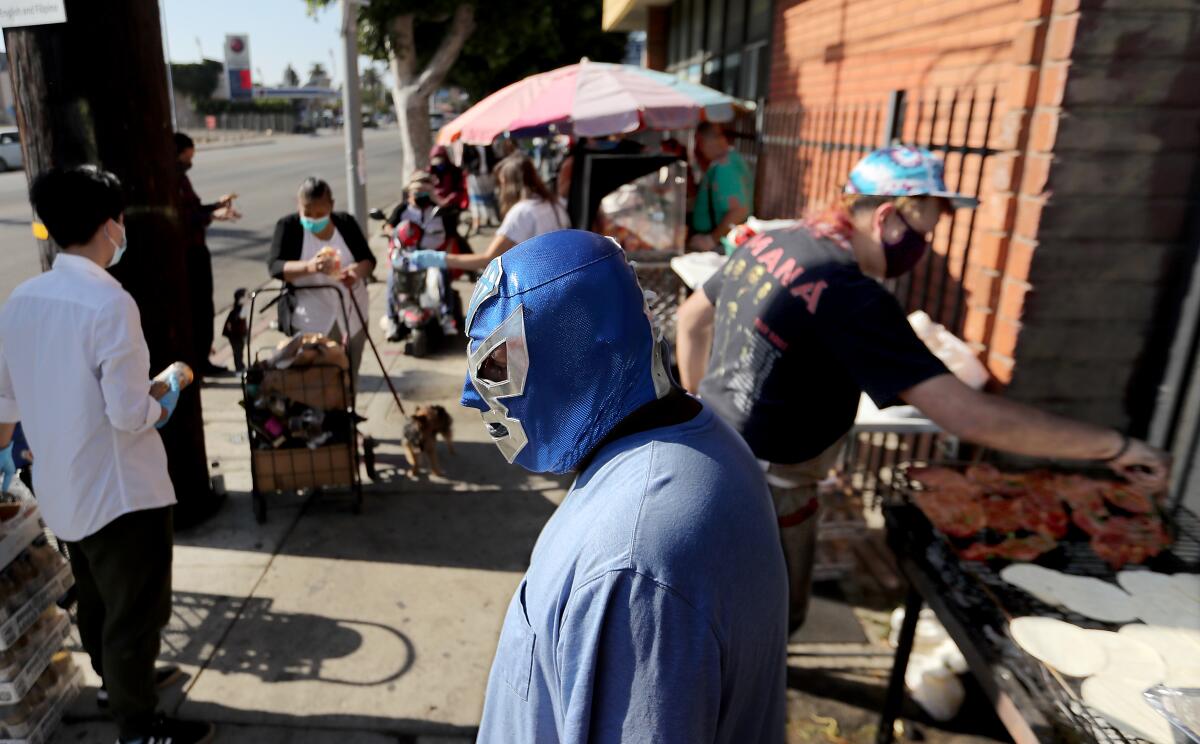
As of Tuesday, the GoFundMe page had raised more than $7,000.
Leyva used some of the money for his own rent. The rest was for others.
He and his brother knew how to dish up satisfying food. How about a community cookout? That was better than giving out packaged goods.
“The need was great, so I had to help,” Leyva said.
On Tuesday afternoon, a line of about 100 people snaked into a strip mall near the intersection of Santa Monica Boulevard and North Vermont Avenue, in front of the Santa Monica Grocery Store. It was the Levyas’ 16th pandemic cookout.
Some were homeless, others jobless. Many felt isolated. A few lamented skipping meals and bills. Almost all were struggling with the realities of survival during a pandemic.
Aided by a dozen volunteers, the Leyva brothers distributed about 200 free meals of chicken and carne asada tacos, cactus salad, salsa, rice and agua de tamarindo.
The amount of food passed out easily topped the 125 plates from the previous cookout. The 100 pounds of meat used that day came from the Santa Monica Grocery Store’s carniceria.
The vast majority of the people in line were Latino — a group that has been disproportionately devastated by the pandemic, falling ill or dying, losing their jobs or performing dangerous essential work.
“This is our community, and who else is going to feed them but us?” Leyva asked. “People need to eat. They need to feel like they belong and have a purpose. COVID-19 has made everyone’s life difficult.”
Once too prideful to ask for help, Gloria Fuentes was stopping by her fourth cookout.
Fuentes, who has lived around the corner for two decades, grabbed a plate of tacos, then walked over to the community fridge and placed a loaf of bread and milk into her black metallic shopping cart.
“I would have never asked for help, never,” said Fuentes, who is in her early 60s and unemployed. “But after seeing this was for the community and by people from the community, I didn’t feel as bad.”
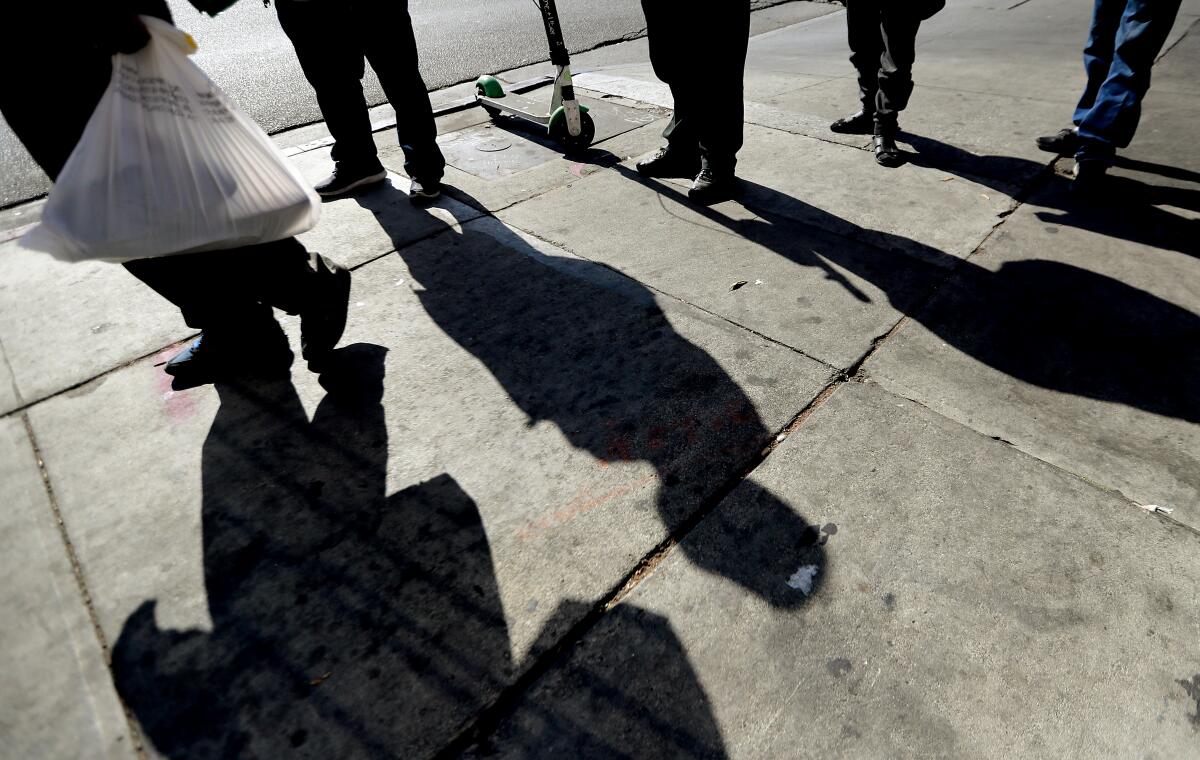
Pat Rodriguez lost her job as a machinist during the pandemic and found herself cutting back on every bill, including groceries, to pay rent.
While many in line seemed grim, Rodriguez occasionally smiled when she spotted people who now feel like friends, on her sixth cookout. The newfound community is valuable for people who are unemployed and mostly homebound.
“COVID-19 has taken a lot from me, from us,” said Rodriguez, 58, of Echo Park. “When I come down here, I feel part of a larger group of people all going through the same problems, and I am thankful someone is looking out for us.”
Times staff writer Garrett Snyder contributed to this report.
More to Read
Start your day right
Sign up for Essential California for news, features and recommendations from the L.A. Times and beyond in your inbox six days a week.
You may occasionally receive promotional content from the Los Angeles Times.
